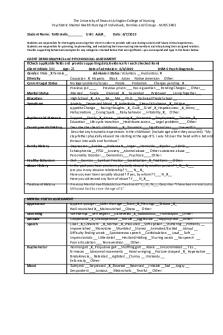Cerebrovascular Accident Care Plan PDF

| Title | Cerebrovascular Accident Care Plan |
|---|---|
| Course | Management of Critical & Emergent Care |
| Institution | University of Missouri-Kansas City |
| Pages | 16 |
| File Size | 359.3 KB |
| File Type | |
| Total Downloads | 16 |
| Total Views | 152 |
Summary
Critical Care Care Plan for a patent with a CVA...
Description
Care Plan Paperwork (Part I) Directions: Complete all areas from the information provided in the case study and your own research.
Pathophysiology: Ischemic CVA How does the disease affect the body? An ischemic stroke occurs when there is an occlusion of the blood flow in the brain vasculature. This deprives the brain of glucose and oxygen. A decrease in blood flow for one minute can cause a loss of consciousness for the patient. A longer deprivation can lead to necrosis of the brain that is irreversible. Patients that experience a significant stroke will motor and sensory issues post stroke.
How is it diagnosed? Strokes are diagnosed with CT scans of the brain without contrast, blood studies, neurological exams and using the NIHSS scale
What are the current treatments and prognosis? Treatment includes restoring the cerebral blood flow by using different agents and preventing recurring strokes. The prognosis depends on the extent of the stroke. If it is a small stroke in a nonvital rea, the patient can recover with minimal deficits. If the stroke is large or in a vital area of the brain, then it is possible that the patient will not recover. What are your Priority Assessments based on Patho (include body systems and specific things you would assess)? I would do a complete NIHSS assessment on my patient which includes assessing level of consciousness, cranial nerves and different areas in the brain to determine the extent and location of the stroke. I would asses labs and an EKG to see the cause of the stroke.
Source for pathophysiology information: Fitzsimmons, B., & Bohan, E. (2009). Critical care nursing: A holistic approach (pp. 891-898) (1010182177 777755919 P. G. Morton & 1010182178 777755919 D. K. Fontaine, Authors). Philadelphia, PA: Wolters Kluwer Health.
Student:___________________________________________ Date:_________________
Your Patients Signs and Symptoms Expected from Patho:
Right arm and right leg weakness Right Facial Weakness Difficulty speaking
Unexpected findings:
Your Patients Lab values- Include all labs (with normal ranges next to them) and explain trends/reason for abnormal labs. Glucose = 103 (80-110) 255 total cholesterol (...
Similar Free PDFs

Cerebrovascular Accident Care Plan
- 16 Pages

NCP Cerebrovascular Accident
- 3 Pages

UTI Care Plan - Care Plan
- 7 Pages

Care plan 3 - Care Plan
- 3 Pages

Care Plan 1 - Care plan
- 7 Pages

Care Plan 2 - Care plan
- 21 Pages

N101L Care Plan - Nursing Care Plan
- 11 Pages

Care Plan - care plan for clinical
- 16 Pages

Care plan MI - care plan mi
- 5 Pages
Popular Institutions
- Tinajero National High School - Annex
- Politeknik Caltex Riau
- Yokohama City University
- SGT University
- University of Al-Qadisiyah
- Divine Word College of Vigan
- Techniek College Rotterdam
- Universidade de Santiago
- Universiti Teknologi MARA Cawangan Johor Kampus Pasir Gudang
- Poltekkes Kemenkes Yogyakarta
- Baguio City National High School
- Colegio san marcos
- preparatoria uno
- Centro de Bachillerato Tecnológico Industrial y de Servicios No. 107
- Dalian Maritime University
- Quang Trung Secondary School
- Colegio Tecnológico en Informática
- Corporación Regional de Educación Superior
- Grupo CEDVA
- Dar Al Uloom University
- Centro de Estudios Preuniversitarios de la Universidad Nacional de Ingeniería
- 上智大学
- Aakash International School, Nuna Majara
- San Felipe Neri Catholic School
- Kang Chiao International School - New Taipei City
- Misamis Occidental National High School
- Institución Educativa Escuela Normal Juan Ladrilleros
- Kolehiyo ng Pantukan
- Batanes State College
- Instituto Continental
- Sekolah Menengah Kejuruan Kesehatan Kaltara (Tarakan)
- Colegio de La Inmaculada Concepcion - Cebu






